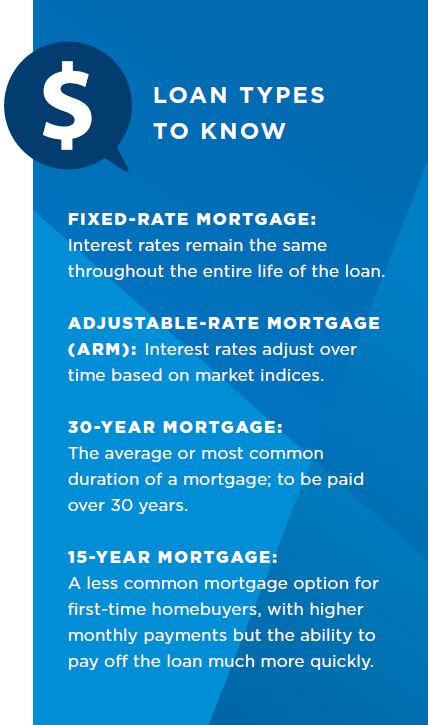Where do I start with the home buying process?
Even if you have purchased before, parts of the process may have changed over time. Once you understand the steps, you can outline a financial path toward homeownership that makes sense for your budget.
When looking at home affordability, beyond the traditional costs that homeowners associate with a new home purchase—down payment, mortgage insurance, real estate taxes, etc.—there are additional expenses that should be factored in. These include the costs of general maintenance, new fixtures or appliances, and all applicable utilities. Remember, you won’t be able to call a landlord to fix unforeseen or hidden problems – that’s now on you!
Additionally, ask yourself these questions to ensure you truly intend to move forward with homeownership:
- What do I want in a home?
- Do I want to live in the city or the suburbs?
- What kind of home do I want to live in? Single-family, condo, townhouse?
These answers could help clarify your vision while keeping your budget intact.
What do my finances look like?
Buying a home is one of the most significant purchases you’ll likely ever make. Before you start your search for a home, have a solid grasp of how much it will cost out of pocket (more on this later), and whether you have the financial history to afford a home at a reasonable interest rate.
You can help ensure you will qualify for a reasonable interest rate by taking steps to improve your debt-to-income ratio before you start the formal home buying process. Additionally, check your credit report to make sure the information is accurate.
If you’re concerned about locking in the lowest interest rate possible, consider different mortgage options. A shorter-term fixed-rate mortgage or an adjustable-rate mortgage (ARM) may secure you a lower interest rate compared to a 30-year-fixed-rate mortgage. But with certain drawbacks, such as fluctuating monthly payments.
Talk to a financial professional about your budget and your financing options. Also, ask yourself how much you are willing to provide for a down payment. A larger down payment may help lower your interest rate and make your monthly payments more manageable. A larger down payment may also help you avoid paying mortgage insurance. There may also be government or local programs that offer down payment assistance for first-time homebuyers.
Are there other home buying costs?
There are several costs to consider when buying a home – some of which may not be well known.
Your home will have to be inspected and appraised before the final purchase paperwork is signed—this is completed outside the standard loan process and is another added expense.
Your mortgage lender will provide a loan estimate, which includes the estimated interest rate, monthly payment and total closing costs. In addition to closing costs at the end of the home buying process, there will also be expenses after the transaction is completed, including homeowner’s insurance, flood insurance, property taxes and a variety of local or municipal fees that may be included.
You may also be required to pay a monthly or yearly homeowners’ association fee depending on the location and type of home you purchase. Home buying expenses add up, so remember to factor in these additional expenses when determining how much you can afford.
How do I prepare for the home search?
Once your finances are in order and you’ve determined what you’re looking for in a home, it’s time to begin your search. The best practice is to secure a mortgage pre-qualification or pre-approval letter from a lender. This informs sellers that you’re serious and have the financial wherewithal to purchase a home.
A pre-qualification letter can be completed more quickly and typically doesn’t entail as rigorous a process. Pre-qualification can be obtained over the phone, online or in person by providing the lender information about your debt, income and assets.
A pre-approval letter requires more information and verification of your financial history, including your credit score and W-2s, to assess the mortgage loan amount you qualify for. This allows you to focus on homes in your price range and can be leverage in a competitive housing market.
Finding your dream home may be easier with the help of a licensed real estate agent. A real estate professional has first-hand experience with facilitating real estate deals and access to the tools necessary to sift through available listings. Find an agent who has experience in helping clients buy homes in the area you want to live.
How do I finalize the home buying deal?
When you find a listing you want to make an offer on, you’ll want a plan that can help increase your chances of having the offer accepted by the seller. This is another reason why hiring a real estate broker is a good idea. An agent’s experience with negotiating final selling prices can help you get the best possible deal.
Also, your real estate professional will have a better understanding of the market you’re buying in. By leveraging this experience, you can feel confident in your ability to either negotiate a better deal or improve your offer to increase the chances of its acceptance.
Once your offer is accepted, the next step is to hire a licensed home inspector to inspect your potential home for safety and structural issues. Inspections may reveal new information, which may require a renegotiation of your offer.
Closing on a home can seem like a complicated process but if you’re prepared you can avoid surprises. Be sure to review documents and ask questions during the closing process. It is critical to know the details of your closing disclosure, which your lender will provide, prior to closing on your home.
When you have your financial affairs in order and the right information at hand, buying a home can be a seamless and rewarding experience. Take the time to research, prepare and plan accordingly and you will soon be enjoying your new home.
Download the complete Homebuying Guide eBook which includes additional information like preparing for home tours, making moving in easier and building equity once your all settled in.
UMB personal banking solutions offer convenience and simplicity to meet all your financial needs. From home loans to auto financing and everything in between, see how UMB personal banking can work with you to find the right products for your life and lifestyle.
Boost your financial know-how and sign up for our personal banking newsletter. We’ll send informative articles right to your inbox.






